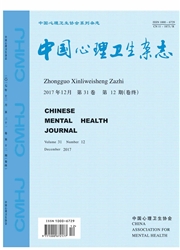

 中文摘要:
中文摘要:
以207名大学生为被试,采用心理韧性量表(CD~RISC)、积极情感量表(PAS)和总体幸福感量表(GWB)进行了为期9周的追踪测查,考察大学生心理韧性的特性及其与积极情绪和幸福感的关系。结果表明:(1)大学生的心理韧性具有一定的稳定性;(2)心理韧性与积极情绪显著正相关,积极情绪可以预测9周后的心理韧性;(3)心理韧性可以预测幸福感,积极情绪在该路径中起部分中介作用。
 英文摘要:
英文摘要:
Base on 207 college students and with Connor-Davidson Resilience Scale, Positive Affect Scale and General Well-Being Schedule, the trait of resilience of the people who felt less stress and the relations of resilience to positive emotion and to subjective well-being were explored. The results showed that: ( 1 ) resilience of college students showed stability to some degree; (2) positive emotion had remarkable positive correlations with resilience, and it can predict the latter significantly; (3) resilience had a significantly positive effect on subjective well-being, positive emotion played partial-mediating role between resilience and subjective well-being.
 同期刊论文项目
同期刊论文项目
 同项目期刊论文
同项目期刊论文
 Respiratory sinus arrhythmia is associated with trait positive affect and positive emotional express
Respiratory sinus arrhythmia is associated with trait positive affect and positive emotional express 期刊信息
期刊信息
